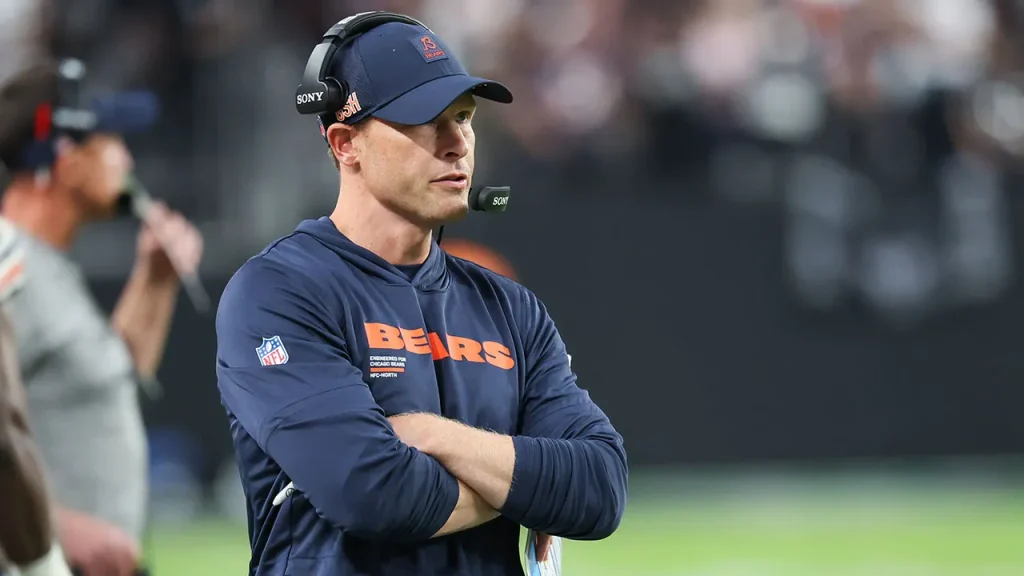Bears Coach Ben Johnson’s Candid Halftime Exchange with Sideline Reporter
In a tense matchup between the Chicago Bears and Las Vegas Raiders, an unexpected moment occurred off the field that caught viewers’ attention. CBS sideline reporter Aditi Kinkhabwala approached Bears head coach Ben Johnson for the customary halftime interview, creating what would become an awkward exchange that quickly went viral on social media. The interaction, while brief, revealed the pressures of in-game coaching and the sometimes challenging dynamic between sports media and team leadership during high-stakes moments.
The conversation began with Kinkhabwala acknowledging Chicago’s offensive struggles in the first half, asking Johnson what message he had delivered to his team in the locker room. Johnson responded professionally, saying, “That it wasn’t our brand of football. We’re capable of a lot more. So, we’re hitting the reset button here at halftime. We’re gonna come back and establish our identity here in the second half.” This standard coach-speak answer reflected Johnson’s desire to motivate his team while maintaining public confidence. However, what followed created an unexpected moment of tension when Kinkhabwala added her own assessment: “You need to change what you’re doing.” Johnson, visibly taken aback, responded with a surprised, “I don’t know. You think so? We’re gonna be just fine,” revealing a rare glimpse of a coach’s genuine reaction when their strategy is directly questioned on national television.
The exchange immediately caught fire across social media platforms, with fans and sports commentators dissecting the interaction from every angle. Some viewers felt Kinkhabwala had overstepped by offering strategic advice to a professional coach, while others appreciated her directness in addressing what many fans were thinking about the Bears’ first-half performance. The moment highlighted the delicate balance sideline reporters must maintain between asking insightful questions and potentially crossing into the territory of coaching criticism. For Johnson, the brief interaction represented the constant scrutiny coaches face, where even routine media obligations can become viral moments that distract from the game itself.
Whatever discomfort the interaction may have caused, Johnson’s halftime message to his players proved effective when the Bears returned to the field. Rookie quarterback Caleb Williams, who had struggled in the first half, immediately led a productive seven-play, 40-yard drive that culminated in a touchdown pass to Rome Odunze. This successful opening drive of the second half demonstrated that Johnson’s “reset button” approach had indeed connected with his players. The Bears continued their improved play throughout the second half, adding another touchdown from running back D’Andre Swift and a critical field goal that positioned them for victory. The team’s response validated Johnson’s confidence expressed in the interview and showed that his halftime adjustments—whatever they may have been—had effectively addressed the first-half issues.
The game’s dramatic conclusion added another layer of intensity to what had already been a compelling narrative. With the Bears clinging to a narrow lead, Raiders quarterback Geno Smith orchestrated a late drive that put Las Vegas in position for a potential game-winning field goal. Kicker Daniel Carlson lined up for a 54-yard attempt that would have given the Raiders the victory in the final moments. However, in a stunning turn of events, the Bears’ special teams unit managed to block the kick, preserving Chicago’s 25-24 victory. This climactic finish ensured that Johnson’s confidence in his team wasn’t misplaced and provided a satisfying conclusion to a game that had featured both on-field drama and sideline tension.
In the broader context of the NFL season, this moment between Johnson and Kinkhabwala serves as a reminder of the human elements that make sports compelling beyond just the plays on the field. Coaches are constantly balancing strategic decisions, player management, and public communication under intense pressure. Sideline reporters face the challenge of extracting meaningful information from coaches who are understandably guarded during games. When these two worlds occasionally clash in unscripted moments, they provide fans with authentic glimpses into the emotional reality of professional sports. For Ben Johnson and the Chicago Bears, this awkward halftime exchange will likely be remembered as a curious footnote in what ultimately became an important victory, demonstrating that sometimes the most memorable moments in sports happen when the cameras are rolling but the script goes out the window.


